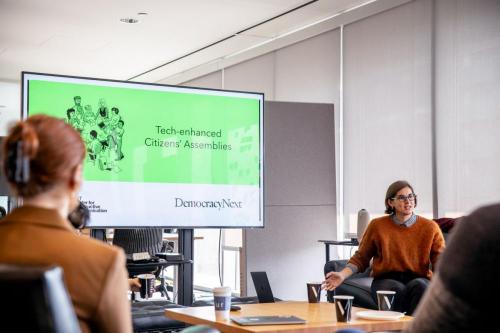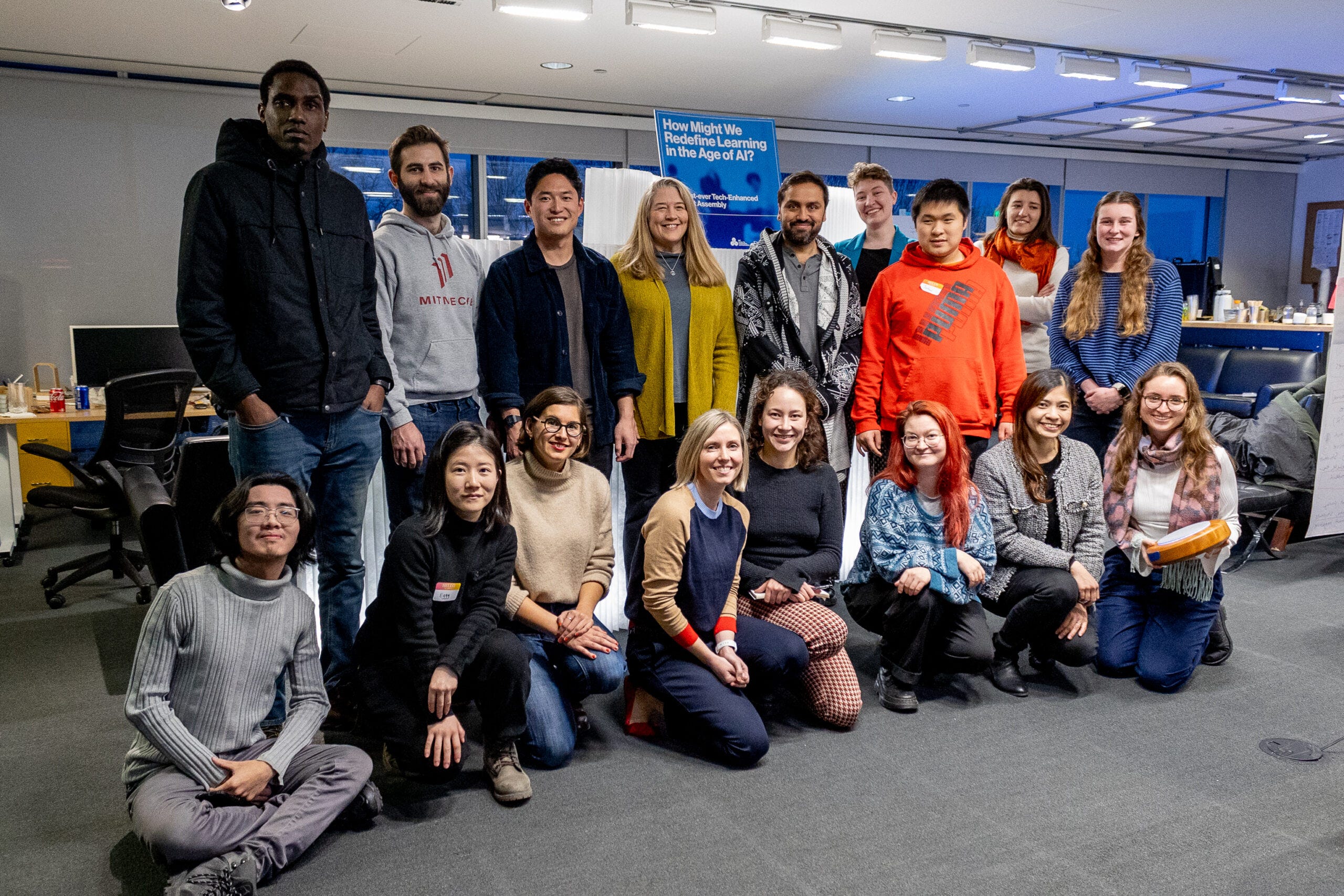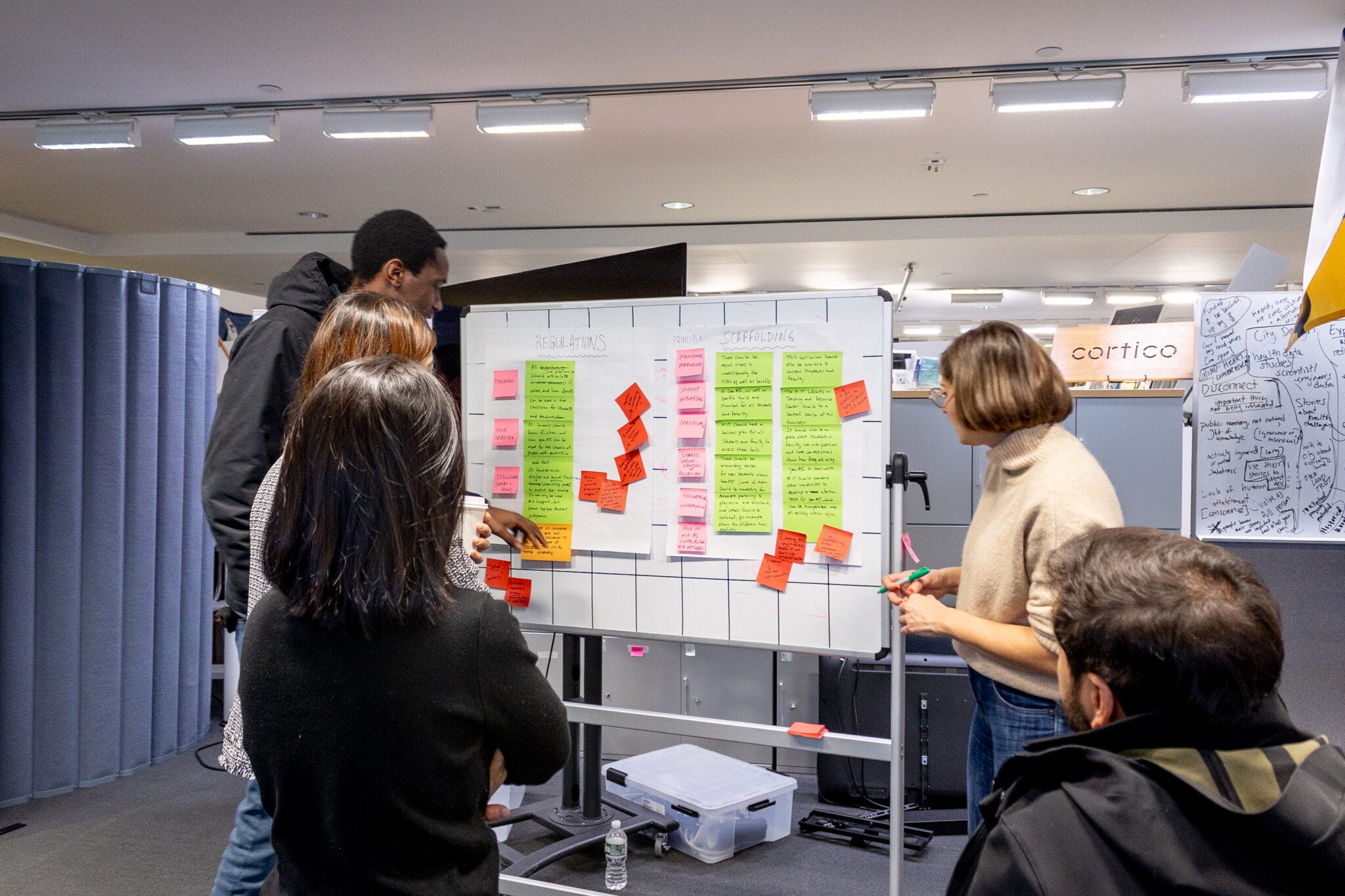
The MIT Center for Constructive Communication (CCC) and the non-profit DemocracyNext came together to design and implement the first tech-enhanced and student-focused version of a Citizens’ Assembly.
 |
Student Assembly members pose for a photo with CCC and DemocracyNext organizing team at the end of the three days. Photo by Artemisia Luk.
“This Student Assembly was a landmark event for us,” says Professor Deb Roy, CCC director. “It was a critical first step in finding how to best integrate human-steered AI to elevate a broad spectrum of voices for meaningful civic discourse.”
Claudia Chwalisz, the founder and CEO of the international research and action institute DemocracyNext, explains that Citizens’ Assemblies “create the democratic spaces for people to grapple with the complexity of policy issues, listen to one another, and find common ground. In doing so, they create the conditions to overcome polarization and strengthen societal cohesion. They bring out the collective intelligence of society — the principle that many diverse people will come to better decisions than more homogenous groups.”
“We need more of these deliberative spaces not just in government, but in other institutions of daily life, including universities,” adds Dimitra Dimitrakopoulou, CCC’s head of translational research. “Especially during these extremely tense times on campuses across the US and the world, we hope this tech-enhanced Student Assembly has served as a model for how educational institutions can help students to engage in meaningful deliberations on the important issues with which they are now grappling.”
In this exploratory three-day event, it was termed a “Student Assembly” to indicate that the group was not selected via a formal sortition process (selecting decision makers by lottery); instead, students were able to enroll in this as a three-day workshop during the Independent Activities Period (IAP) at MIT. Assembly members included both undergraduate and graduate students from a variety of academic disciplines, from applied mathematics and computer science to urban studies and planning.

Assembly members were asked to collectively deliberate about the risks and benefits in using Generative AI as part of the learning experience in the classroom.
Over the course of the three days, members engaged in the typical experiences of Citizens’ Assemblies, including: A panel discussion with experts, featuring Dr. Janet Rankin, director of teaching and learning at MIT, Dr. Jad Kabbara, research scientist at CCC, and Prerna Rav, PhD student at the MIT Computer Science & Artificial Intelligence Laboratory (CSAIL). Small group deliberation followed by large-group plenary discussions. Voting on a final series of recommendations (only those that received more than 75% endorsement across the Assembly members were adopted).
Members were also able to engage with novel tools designed and implemented by CCC students to enhance conversations and learning, such as: Analogia, a story-telling card game designed by Cassie Lee, graduate student at CCC. Recorded small group conversations using the conversation platform Fora run by CCC’s non-profit deployment partner, Cortico. AI-generated summaries of small group conversations developed by CCC graduate students Michael Wong and Shrestha Mohanty. Interactive boards and visualizations that mapped conversation dynamics, such as tension and closeness, over the course of the assembly designed by CCC PhD student Maggie Hughes with input from CCC graduate student Naana Obeng-Marnu. Pre- and post-surveys to capture members’ sentiment and engagement in the deliberative process designed by CCC PhD students Daniel Kessler and Suyash Fulay.
 |
Claudia Chwalisz from DemocracyNext facilitates a plenary discussion in which students deliberate on ways to regulate the use of generative AI in classes at MIT. Photo by Artemisia Luk.
These technological enhancements offered unique avenues to innovate on existing Citizens’ Assembly processes and also posed interesting questions for the future of deliberation: How do we want AI tools to assist in sensemaking and where do the individuals themselves need to lead the hard work of synthesizing complex ideas? How do we use such technology responsibly, whether to support members and facilitators, or to increase visibility into the Assembly process for journalists and outside parties?
Student feedback will be used to further develop these tools and technologies in preparation for a Citizens’ Assembly in Bend, Oregon taking place in 2024 with around 36 citizens to deliberate on housing insecurity.
The First-Ever Tech-Enhanced Student AssemblyA dozen students gathered to deliberate on ethical guidelines and regulations needed to govern the use of generative AI for faculty and students at MIT
The MIT Center for Constructive Communication (CCC) and the non-profit DemocracyNext came together to design and implement the first tech-enhanced and student-focused version of a Citizens’ Assembly.
Student Assembly members pose for a photo with CCC and DemocracyNext organizing team at the end of the three days. Photo by Artemisia Luk. “This Student Assembly was a landmark event for us,” says Professor Deb Roy, CCC director. “It was a critical first step in finding how to best integrate human-steered AI to elevate a broad spectrum of voices for meaningful civic discourse.”  Members were welcomed with materials on their first day / Deb Roy kicks off the opening of the Student Assembly / Panelists Prerna Rav, Dr. Jad Kabbar, and Dr. Janet Rankin (Photos by Artemisia Luk and Heather Pierce)
Assembly members were asked to collectively deliberate about the risks and benefits in using Generative AI as part of the learning experience in the classroom.
Claudia Chwalisz from DemocracyNext facilitates a plenary discussion in which students deliberate on ways to regulate the use of generative AI in classes at MIT. Photo by Artemisia Luk. These technological enhancements offered unique avenues to innovate on existing Citizens’ Assembly processes and also posed interesting questions for the future of deliberation: How do we want AI tools to assist in sensemaking and where do the individuals themselves need to lead the hard work of synthesizing complex ideas? How do we use such technology responsibly, whether to support members and facilitators, or to increase visibility into the Assembly process for journalists and outside parties? |









